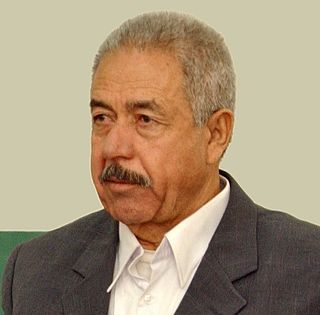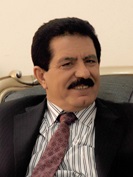Related Research Articles

The Iran–Iraq War, also known as the First Gulf War, was an armed conflict between Iran and Iraq that lasted from September 1980 to August 1988. Active hostilities began with the Iraqi invasion of Iran and lasted for eight years, until the acceptance of United Nations Security Council Resolution 598 by both sides. Iraq's primary rationale for the attack against Iran cited the need to prevent Ruhollah Khomeini—who had spearheaded the Iranian Revolution in 1979—from exporting the new Iranian ideology to Iraq. There were also fears among the Iraqi leadership of Saddam Hussein that Iran, a theocratic state with a population predominantly composed of Shia Muslims, would exploit sectarian tensions in Iraq by rallying Iraq's Shia majority against the Baʽathist government, which was officially secular and dominated by Sunni Muslims. Iraq also wished to replace Iran as the power player in the Persian Gulf, which was not seen as an achievable objective prior to the Islamic Revolution because of Pahlavi Iran's economic and military superiority as well as its close relationships with the United States and Israel.

Saddam Hussein was an Iraqi politician, revolutionary and dictator who served as the fifth president of Iraq from 1979 to 2003. He also served as prime minister of Iraq from 1979 to 1991 and later from 1994 to 2003. He was a leading member of the revolutionary Arab Socialist Ba'ath Party and later its Iraqi regional branch. Ideologically, he espoused Ba'athism, a mix of Arab nationalism and Arab socialism, while the policies and political ideas he championed are collectively known as Saddamism.
The Protocol for the Prohibition of the Use in War of Asphyxiating, Poisonous or other Gases, and of Bacteriological Methods of Warfare, usually called the Geneva Protocol, is a treaty prohibiting the use of chemical and biological weapons in international armed conflicts. It was signed at Geneva on 17 June 1925 and entered into force on 8 February 1928. It was registered in League of Nations Treaty Series on 7 September 1929. The Geneva Protocol is a protocol to the Convention for the Supervision of the International Trade in Arms and Ammunition and in Implements of War signed on the same date, and followed the Hague Conventions of 1899 and 1907.

A weapon of mass destruction (WMD) is a biological, chemical, radiological, nuclear, or any other weapon that can kill or significantly harm many people or cause great damage to artificial structures, natural structures, or the biosphere. The scope and usage of the term has evolved and been disputed, often signifying more politically than technically. Originally coined in reference to aerial bombing with chemical explosives during World War II, it has later come to refer to large-scale weaponry of warfare-related technologies, such as biological, chemical, radiological, or nuclear warfare.

Sarin is an extremely toxic organophosphorus compound. A colourless, odourless liquid, it is used as a chemical weapon due to its extreme potency as a nerve agent. Exposure can be lethal even at very low concentrations, where death can occur within one to ten minutes after direct inhalation of a lethal dose, due to suffocation from respiratory paralysis, unless antidotes are quickly administered. People who absorb a non-lethal dose and do not receive immediate medical treatment may suffer permanent neurological damage.

Iraq under the Arab Socialist Ba'ath Party saw severe violations of human rights. Secret police, state terrorism, torture, mass murder, genocide, ethnic cleansing, rape, deportations, extrajudicial killings, forced disappearances, assassinations, chemical warfare, and the destruction of the Mesopotamian marshes were some of the methods Saddam Hussein and the country's Ba'athist government used to maintain control. Saddam committed crimes of aggression during the Iran–Iraq War and the Gulf War, which violated the Charter of the United Nations. The total number of deaths and disappearances related to repression during this period is unknown, but is estimated to be at least 250,000 to 290,000 according to Human Rights Watch, with the great majority of those occurring as a result of the Anfal genocide in 1988 and the suppression of the uprisings in Iraq in 1991. Human Rights Watch and Amnesty International issued regular reports of widespread imprisonment and torture.
The Halabja massacre took place in Iraqi Kurdistan on 16 March 1988, when thousands of Kurds were killed by a large-scale Iraqi chemical attack. A targeted attack in Halabja, it was carried out during the Anfal campaign, which was led by Iraqi military officer Ali Hassan al-Majid. Two days before the attack, the city had been captured by Iran as part of Operation Zafar 7 of the Iran–Iraq War. Following the incident, the United Nations launched an investigation and concluded that mustard gas and other unidentified nerve agents had been used against Kurdish civilians. The United States Defense Intelligence Agency initially blamed Iran for the attack, though the majority of evidence later revealed that Iraq had used the chemical weapons to bolster an ongoing military offensive against Iran, pro-Iranian Kurdish fighters, and ordinary Halabja residents.

Halabja is a city in the Kurdistan Region of Iraq and the capital of Halabja Governorate, located about 240 km (150 mi) northeast of Baghdad and 14 km (9 mi) from the Iranian border.

The Anfal campaign was a counterinsurgency operation which was carried out by Ba'athist Iraq from February to September 1988 during the Iraqi–Kurdish conflict at the end of the Iran–Iraq War. The campaign targeted rural Kurds because its purpose was to eliminate Kurdish rebel groups and Arabize strategic parts of the Kirkuk Governorate. The Ba’athist regime committed atrocities on the local Kurdish population, mostly civilians.
Frans Cornelis Adrianus van Anraat is a Dutch war criminal and a businessman. He sold raw materials for the production of chemical weapons to Iraq during the reign of Saddam Hussein. In December 2005, a court in The Hague convicted him of complicity in war crimes for his role in selling chemical weapons to Saddam's government. He was given a 15-year sentence. On appeal, Anraat's sentence was increased to 17 years, then reduced to 16.5 years. He was released from prison in 2015.

United States support for Ba'athist Iraq during the Iran–Iraq War, in which it fought against post-revolutionary Iran, included several billion dollars' worth of economic aid, the sale of dual-use technology, military intelligence, and special operations training. The U.S. refused to sell arms to Iraq directly due to Iraq's ties to Palestinian groups which the U.S. designates as terrorist organizations such as the Palestinian Liberation Front and Abu Nidal Organization, but several sales of "dual-use" technology have been documented; notably, Iraq purchased 45 Bell helicopters for $200 million in 1985. Of particular interest for contemporary Iran–United States relations are accusations that the U.S. government actively encouraged Iraqi leader Saddam Hussein to invade Iran, supported by a considerable amount of circumstantial evidence and generally regarded as the conventional wisdom in the Arab world, but several scholars and former U.S. government officials deny that any such collusion occurred, and no direct documentary proof of it has been found.

In violation of the Geneva Protocol of 1925, the Iraqi Army initiated two failed and one successful (1978–1991) offensive chemical weapons (CW) programs. President Saddam Hussein (1937–2006) pursued the most extensive chemical program during the Iran–Iraq War (1980–1988), when he waged chemical warfare against his foe. He also used chemicals in 1988 in the Al-Anfal Campaign against his civilian Kurdish population and during a popular uprising in the south in 1991.

Operation Zafar 7 was an Iranian offensive during the Iran–Iraq War. The Iranian military operation was successfully led by Lieutenant General Hossein Hassani Sa'di where Iran won the battle and also repelled the ensuing Iraqi Counterattack. However, Iran faced technical setbacks with massive economic and military sanctions in place against the country. As a result of those setbacks, Iran was unable to reach its objective of capturing Sulaymaniyah.

Diplomatic relations between Iraq and the United States began when the U.S. first recognized Iraq on January 9, 1930, with the signing of the Anglo-American-Iraqi Convention in London by Charles G. Dawes, U.S. Ambassador to the United Kingdom. The historiography of Iraq—United States relations prior to the 1980s is considered relatively underdeveloped, with the first in-depth academic studies being published in the 2010s. Today, the United States and Iraq both consider themselves as strategic partners, given the American political and military involvement after the invasion of Iraq and their mutual, deep-rooted relationship that followed. The United States provides the Iraqi security forces hundreds of millions of dollars of military aid and training annually as well as uses its military bases.

From 2001 to 2003, there was a military conflict in Iraqi Kurdistan between the Islamist militant group Ansar al-Islam and its allies against the Kurdistan Regional Government (KRG). The conflict began in 2001 as an insurgency, but subsequently merged with the larger 2003 invasion of Iraq after Operation Viking Hammer. After the invasion, Ansar al-Islam moved southwards to participate in the Iraqi insurgency and, after it was quelled, the Syrian civil war.

Kosrat Rasul Ali is a Kurdish politician and the leader of the Supreme Political Council of Patriotic Union of Kurdistan (PUK), veteran Peshmerga military leader, former Prime Minister, and former Vice President of the Kurdistan Region.

The 1983–1986 Kurdish rebellions in Iraq occurred during the Iran–Iraq War as PUK and KDP Kurdish militias of Iraqi Kurdistan rebelled against Saddam Hussein as part of the Iraqi–Kurdish conflict, in an attempt to form an independent state. With Iraqi government forces occupied by the Iran-Iraq War, Kurdish Peshmerga succeeded in taking control of some enclaves, with Iranian logistic and sometimes military support. The initial rebellion resulted in stalemate by 1985.
The University of Halabja, orUoH is one of the Iraqi Kurdistan public universities founded in 2011 in the city of Halabja, Halabja Governorate. The university offers a variety of programs such as human sciences, law, physical education, engineering, sciences. Programs last for four years and students receive BA degrees in their corresponding fields at the end of the fourth year. the university campus is situated in Halabja and the college of Education in Sharazoor District. The first president of Halabja University was Dr. Khasraw Abdulla Ali. The current president is Dr. Mahabad Kamil Abdullah

During the Iran–Iraq War (1980–1988), Iraq engaged in chemical warfare against Iran on multiple occasions, including more than 30 targeted attacks on Iranian civilians. The Iraqi chemical weapons program, which had been active since the 1970s, was aimed at regulated offensive use, as evidenced in the chemical attacks against Iraqi Kurds as part of the Anfal campaign in the late 1980s. The Iraqis had also utilized chemical weapons against Iranian hospitals and medical centres. According to a 2002 article in the American newspaper The Star-Ledger, 20,000 Iranian soldiers and combat medics were killed on the spot by nerve gas. As of 2002, 5,000 of the 80,000 survivors continue to seek regular medical treatment, while 1,000 are hospital inpatients. Though the use of chemical weapons in international armed conflict was banned under the Geneva Protocol, much of the international community remained indifferent to the attacks; Iraq's military campaign in Iran was supported by the United States and the Soviet Union, both of whom had sought to contain Iranian influence after the Islamic Revolution of 1979.
References
- 1 2 "Joost Hiltermann - International Crisis Group". International Crisis Group. Archived from the original on 2015-04-02.
- ↑ Joost Hiltermann, The New York Review of Books
- ↑ amazon.com A Poisonous Affair: America, Iraq, and the Gassing of Halabja